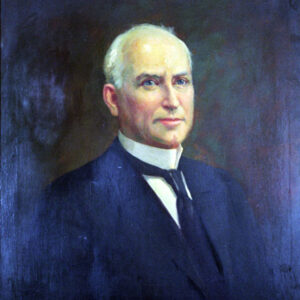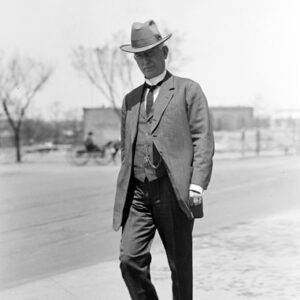calsfoundation@cals.org
James Paul Clarke (1854–1916)
Eighteenth Governor (1895–1897)
James Paul Clarke, eighteenth governor of Arkansas and a United States senator, became an advocate of the silver monetization crusade associated with the William Jennings Bryan wing of the Democratic Party. He was also a defender of white supremacy as the key doctrine of his party.
James Clarke was born in Yazoo County, Mississippi, on August 18, 1854, to Walter Clarke, an architect, and Ellen White, daughter of a prominent planter. After editing a paper in Yazoo City, Clarke received a law degree from the University of Virginia in 1878.
In 1879, Clarke moved to Arkansas, settling first at Ozark (Franklin County). Within a year he moved to Helena (Phillips County), where he began a successful law practice. Clarke married Sallie Moore Wooten of Moon Lake, Mississippi, on November 10, 1883; they had one son and two daughters. In 1886, Clarke won election to a two-year term as the Phillips County representative to the Arkansas House of Representatives. In the 1888 election, Clarke won a seat in the state Senate, where he served two successive terms, holding the position of president of the Senate and lieutenant governor ex officio during his second term in 1891. In 1892, he easily won election to the office of attorney general but chose to serve only one term in order to seek the governor’s chair.
At their state convention in July 1894, Arkansas Democrats chose Clarke as their gubernatorial nominee by acclamation. Clarke called for the free and unlimited coinage of silver, and this inflationary idea had wide support among Arkansas’s farmers who earlier had abandoned the party in order to support the Union Labor party. This defeat for conservative or “gold” Democrats soon led the party to appropriate more planks from the Populist movement.
The Democratic candidate also struck at both the Populist and Republican threats by upholding white supremacy as the keystone of the Democratic Party. “The people of the South,” he said in his closing speech of the election, “looked to the Democratic party to preserve the white standards of civilization.” Clarke easily defeated his opponents.
One of the most dramatic populist reforms debated during Clarke’s administration concerned regulation of the railroad corporations. Joseph Taylor Robinson, who would later serve as Arkansas governor and United States senator, introduced in the Arkansas House of Representatives a bill creating a state railroad commission. The bill was defeated. On March 5, 1895, in an interview with a reporter from the Memphis Commercial Appeal, Governor Clarke charged that the Iron Mountain Railroad had “purchased the defeat of the Railroad Commission Bill.” Clarke’s statements cast suspicions on those who had voted against the bill.
William Robert Jones, chairman of the House Ways and Means Committee, who had led the opposition to the commission bill, took heated exception to Clarke’s insinuations of bribery. He and Clarke exchanged angry words on April 7, 1895, and Clarke’s famous temper was evidenced when he spit in Jones’s face.
Rather than seek the second term Arkansas traditionally granted most governors, Clarke tried to win the U.S. Senate seat of James K. Jones in the 1896 primary elections but was defeated. Before returning to politics, Clarke practiced law in Little Rock (Pulaski County).
In 1902, Governor Jeff Davis and Clarke formed a political alliance that gave the Davis machine new strength in the Delta region and gained Clarke a powerful advocate in his second attempt to unseat Jones. To avoid conflict within the party, both Clarke and Jones agreed that the state legislature should choose the winner of the primary as senator. After Jones lost the primary, he began to hedge on his promise. The state legislature upheld the decision of the primary election and sent Clarke to the Senate. He was reelected in 1909 and again in 1915. In the 1914 primary election, William Fosgate Kirby, an agrarian Radical Democrat, gathered the remnants of the Davis political machine behind him and almost unseated Clarke.
In Clarke, the Senate gained an independent-minded and volatile personality. The Arkansas Gazette characterized him as having a “tongue like a scythe blade that can cut and carve.” He served as president pro tempore of the Senate in Sixty-third and Sixty-fourth Congress. He also served as chairman of the Commerce Committee. During his tenure in the Senate, he frequently supported progressive legislation. He voted for the Hepburn Bill, strengthening the rate-setting powers of the Interstate Commerce Commission, and supported the creation of a children’s bureau in the Labor Department, the direct election of senators, and the Clayton Anti-Injunction Act. He unsuccessfully proposed a measure to grant independence to the Philippines.
After an illness of a few days, Clarke died on October 1, 1916, at his home in Little Rock and is buried at Oakland Cemetery. William F. Kirby was elected to complete Clarke’s term as senator. In 1921, the Arkansas General Assembly approved a statue of Clarke to stand in the National Statuary Hall Collection at the U.S. Capitol; however, in 2019, the Arkansas General Assembly voted to replace the statues of Uriah M. Rose and Clarke with statues of Daisy Bates and Johnny Cash.
For additional information:
Donovan, Timothy P., Willard B. Gatewood Jr., and Jeannie M. Whayne, eds. The Governors of Arkansas: Essays in Political Biography. 2d ed. Fayetteville: University of Arkansas Press, 1995.
Niswonger, Richard L. “Arkansas and the Election of 1896.” Arkansas Historical Quarterly 34 (Spring 1975): 41–78.
———. “Arkansas Democratic Politics, 1896–1920.” Ph.D. diss., University of Texas at Austin, 1974.
Richard L. Niswonger
Siloam Springs, Arkansas
This entry, originally published in Arkansas Biography: A Collection of Notable Lives, appears in the CALS Encyclopedia of Arkansas in an altered form. Arkansas Biography is available from the University of Arkansas Press.
 Politics and Government
Politics and Government Post-Reconstruction through the Gilded Age, 1875 through 1900
Post-Reconstruction through the Gilded Age, 1875 through 1900 James Clarke
James Clarke  James Clarke
James Clarke 




Comments
No comments on this entry yet.